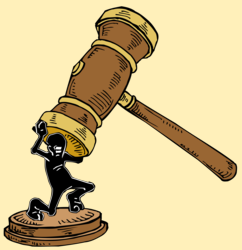Oppression is a word that gets thrown around everywhere these days – sometimes reasonably, sometimes not. People with a basic sense of decency all over the world agree that oppression is wrong and inhumane. Further, they would agree that oppression should be eliminated from human societies. Yet, if we do not have a clear standard definition, upon which we can measure the existence and non-existence of oppression, how can we eliminate it?
For instance:1- Is oppression a legal/structural definition? If so, we need to be careful and precise, because vagueness dilutes our demands.2- Is it a psychological/cultural definition? If so, who determines it? Such a definition may make it a subjective term that cannot be clearly agreed upon by all people, and worse, we cannot formulate agendas (e.g. demands, priorities and policies) that address it sufficiently.
We, human beings, come from different cultures and experiences, and we seldom agree on all issues and world-views. This is precisely why we need to clearly define our common ground, in order to have sustainable collective priorities. When we want to uproot oppression from our relations, we need to start by defining it.
For example: While there are always psychological and cultural dimensions to systems of oppression (even within legal and structural frameworks), the working definition of oppression in the writings of some Pan-Africanist figures like Steve Biko and Frantz Fanon, translates at the end to concrete demands. These demands are summarized as reclaiming the material wealth and power of the people. That reclaiming goal gives the people clarity of purpose.
The tools Biko and Fanon used to approach that purpose is through empowering the agency of oppressed groups, which is effectively self-determination at work (a process, not an event). Whether the organizations of the oppressed are communal grassroots projects or national liberation movements, they seek a dual weapon of internal education and external resistance as their platform.

The following is a relevant case study from Sudan: a relatively new movement, led by female activists (both younger and senior more seasoned women activists), called ‘No to Oppressing Women’ (لا لقهر النساء). This movement’s primary message counters patriarchal norms in our society, and the deeply-rooted institutions that propagate it, yet the movement translates that countering into concrete demands and projects; such as confronting the security forces and exposing their ill-treatment of female political detainees and the use of rape and sexual assault as a weapon of war against women of marginalized groups, as well as demanding policy change against the laws that threaten female-headed small-businesses and female domestic workers, along with taking initiatives to organize and mobilize Sudanese women on other issues. Many male allies support the movement, in various ways, but leadership and management remains with women.
The Oxford English Dictionary defines oppression as, “Prolonged cruel or unjust treatment or exercise of authority, control, or power; tyranny; exploitation. Also: an act or instance of this.” This is a fair, but insufficient, definition. A more comprehensive definition is as follows:
“In its traditional usage, oppression means the exercise of tyranny by a ruling group. Yet, oppression creates injustice in other circumstances as well… No matter which definition you use, oppression is when people reduce the potential for other people to be fully human. In other words, oppression is when people make other people less human. This could mean treating them in a dehumanizing manner. But, it could also mean denying people language, education, and other opportunities that might make them become fully human in both mind and body.” (Iris Young, “Five Faces of Oppression”, a chapter in the book Oppression, Privilege and Resistance, edited by Heldke and O’Connor, 2004).
The different types of oppression include Exploitation, Marginalization, Cultural Imperialism, and Violence. The review above gets us closer to our definition. One piece seems to be missing still, and that is: how do we measure the existence of oppression and its severity, and how do we measure the opposite?
What concerns us about oppression is the consequences of oppression on people directly impacted by it; and that is how we can recognize it. When a group in society assumes the right to dominate another group (whether that dominant group is a majority or minority) and exploit it for its own benefits, we can recognize oppression at work. ‘Cultural’ and ‘psychological’ notions of oppression remain ambiguous concepts, which can be debated for life times, until you point out an effect on the fundamental human rights of oppressed groups. Luckily, we have a good and universal definition of fundamental human rights, written in a precise document—the universal declaration of human rights. If we can tie the definition of oppression to fundamental human rights, then we can measure oppression and anti-oppression by the same legal parameters accepted universally (or mostly accepted – legally – universally, but still needs work to achieve genuine universal consensus).
Thus, we can conclude by saying that, a group of people can be recognized as oppressed if:a- It is denied, systemically or practically, its fundamental human rights (i.e. right to life and right to liberty, and their derivatives), and/or,b- It is exploited by external forces/groups in society for the benefit of those others (i.e., exploitation of labor, resources, etc.)
This is not a final and rigid definition, but something we can work with. It is however important to sustain clarity on a basic level. Notions of cultural/psychological oppression, although clearly present, are a slippery slope outside of objective indicators.
“To define, after all, is to set limits.”
– Jnanabrata Bhattacharyya
(published in the Citizen Newspaper, Sudan, June 16, 2013)
